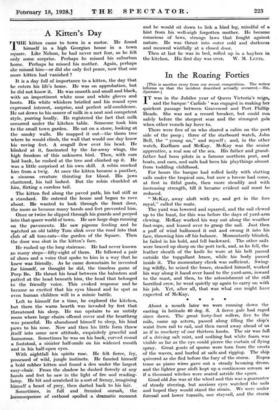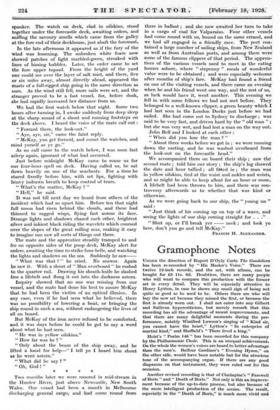In the Roaring Forties
[This is another story from our recent competition. The writer informs us that the incident described actually 000urred.—En. Spectator.] IT was in the Jubilee year of Queen Victoria's reign, and the barque Carlisle ' was engaged in making her quickest passage between Gravesend and Port Phillip Heads. She was not a record breaker, but could run safely before the steepest seas and the strongest gale when other vessels lay hove to.
There were five of us who shared a cabin on the port side of the poop ; three of the starboard watch, John Bell, the " young un," and myself ; and, in the other watch, Eariham and McKay. McKay was the senior apprentice, a real son of the sea. His father and grand- father had been pilots in a famous northern port, and boats, and oars, and sails had been his playthings almost from toddling childhood.
For hours the barque had rolled lazily with slatting sails under the tropical sun, but now a breeze had come, at first in fitful gusts, then more steadily and with increasing strength, till it became evident sail must be reduced.
" McKay, away aloft with ye, and get in the fore royal," called the mate.
The yard was lowered and squared, and the sail dewed up to the bunt, for this was before the days of yard-arm clewing. McKay worked his way out along the weather foot-rope, and leaned over to grasp the sail. Just then a puff of wind ballooned it out and swung it into his face, throwing him off his balance. Momentarily blinded, he failed in his hold, and fell backward. The other sails were braced up sharp on the port tack, and, as he fell, the leather sheath of the knife he wore at his belt passed outside the topgallant brace, while his body passed inside it. The momentary check was sufficient. Swing- ing wildly, he seized the brace, steadied himself, worked his way along it hand over hand to the yard-arm, inward to the mast, and then, to the astonishment of the still horrified crew, he went quietly up again to carry on with his job. Yet, after all, that was what one might have expected of McKay.
* * * * About a month later we were running down the easting in latitude 40 deg. S. A fierce gale had raged since dawn. The great forty-foot rollers, five to the mile, came up astern, passed along filling the ship's waist from rail to rail, and then raced away ahead of us as if in mockery of our thirteen knots. The air was full of a driving salt mist, and nothing but white foam_ was visible as far as the eye could pierce the curtain of flying spray. Great gouts of spume were torn from the crests of the waves, and hurled at sails and rigging. The ship quivered as she fled before the fury of the storm. Ropes tense as piano wires gave out a steady booming drone, and the lighter gear aloft kept up a continuous scream as if a thousand witches were seated astride the spars.
Good old Joe was at the wheel and this was a guarantee of steady steering, but anxious eyes watched the sails and hoped they would stand the strain. We were under foresail and lower topsails, one staysail, and the storm spanker. The watch on deck, clad in oilskins, stood' together under the forecastle deck, awaiting orders, and sniffing the savoury smells which came from the galley at the fore end of their deckhouse, just abaft the foremast.
In the late afternoon it appeared as if the fury of the Wind was lessening. The unbroken white foam now showed patches of light marbled-green, streaked with lines of hissing bubbles. Later, the order came to set the fore upper topsail. From the height of the yard one could see over the layer of salt mist, and there, five or six miles away, almost directly ahead, appeared the masts of a full-rigged ship going in the same direction as ours. As the wind still fell, more sails were set, and the stranger proved to be a fast vessel, for, before dusk, she had rapidly increased her distance from us.
We had the first watch below that night. Some two hours after turning in, I awoke suddenly from deep sleep at the sharp sound of a shout and running footsteps on the deck above. I heard the voice of the mate call out : " Forrard there, the look-out."
" Aye, aye, sir," came the faint reply.
" McKay, you get forrard, and count the watches, and Mind yerself as ye go." As no call came to the watch below, I was soon fast asleep again, ignorant of what had occurred.
Just before midnight McKay came to rouse us for our four-hour spell on deck. Having called us, he sat down heavily on one of the seachests. For a time he stared fixedly before him, with set lips, fighting with heavy indrawn breath to keep control of tears.
" What's the matter, McKay ? "
" Hell," he said.
- It was not till next day we heard from others of the incident which had so upset him. Before ten that night full moon had risen behind the clouds, and these had thinned to ragged wisps, flying fast across its face. Strange lights and shadows chased each other, brightest silver and inkiest black riding the wavelets which coursed over the slopes of the great rolling seas, making it easy to imagine one saw all sorts of things out there.
The mate and the apprentice steadily tramped to and fro on opposite sides of the poop deck, McKay alert for orders, awaiting the time to strike four-bells, and watching the lights and shadoWs on the sea. Suddenly he saw " What was that ? " he cried. No answer. Again he saw it. With a shout of " Man overboard " he rushed to the quarter rail. Drawing his sheath-knife he slashed free a lifebelt and flung it out into the darkness astern.
Inquiry showed that no one was missing from our vessel, and the mate had done his best to assure McKay that he had been the victim of an optical illusion. In any case, even if he had seen what he believed, there was no possibility of lowering a boat, or bringing the ship round in such a sea, without endangering the lives of all on board.
But McKay of the iron nerve refused to be comforted, and it was days before he could be got to say a word about what he had seen.
" He was in yellow oilskins."
" How far was he ? "
" Only about the beam of the ship away, and he lifted a hand for help—" I tell ye I heard him shout as he went astern."
" What did he say ? "
" Oh, God ! " * * * * - Two months later we were moored in mid-stream in the Hunter • River, just above.Newcastle, New South Wales: Our • vessel had been a -month in Melbourne discharging general. cargo; and had. come round from there in ballast ; and she now awaited her turn to take in a cargo of coal for Valparaiso. Four other vessels had come round with us, bound on the same errand, and We had all engaged in a friendly race. The port con- tained a large number of sailing ships, from New Zealanil as well as from Australian ports, and among them were some of the famous clippers of that period. The appren-. tices of the various vessels used to meet in the eating houses ashore, where " sixpenny " . meals of wonderful value were to be obtained ; and were especially welcome after months of ship's fare. McKay had found a friend on one of the visiting vessels,- and there came an evening' when he and his friend went one way, and the rest of us, as luck would have it, went another. This evening we fell in with some fellows. we had not met before. They belonged to a well-known clipper, a green beauty which I had last seen in the London Docks just before we had sailed. She had come out to Sydney to discharge ; was said to be very fast, and driven hard by the " old man " ; but she was very wet, -and- had lost- a man on the way out.
John Bell and r looked at each other " When did you lose the man ? "
" About three weeks before we got in ; we were running down the Basting, and he was washed overboard from the look-out on the forecastle head."
We accompanied them on board their ship ; saw the second mate ; told him our story ; the ship's log showed the date and hour tallied ; all fitted in ; the man was in yellow oilskins, tied at the waist and ankles and wrists; and so might be able to keep afloat for an hour or more. A lifebelt had been thrown to him, and there was eon- troversy afterwards as to -whether that was kind or otherwise.
As we were going back to our ship, the " young un 'r said : " Just think of his coming up on top of a wave, and seeing the lights of our ship coming straight for . . .".
" Shut up, or I'll break yer — neck ; and look ye here, don't you go and tell McKay."
FRANCIS H. ALEXANDER.







































 Previous page
Previous page